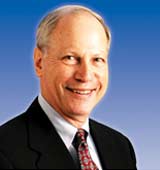 Michael Beer
Michael Beer
Cahners-Rabb Professor of Business Administration,
Emeritus at the Harvard Business School,
Chairman and co-founder of TruePoint a research based consultancy.

Ph.D. I decided to go
into practice a job at Corning Inc.,
instead of taking an academic job.
I always had a bent to the practical
and knew that to understand
organizations, one had to be close to
the phenomena. Corning hired me as
a researcher and I initially thought
that my job would be to do studies of
various problems for the human
resource function. The trigger for my
change research was a call for help I
received from a small start-up
manufacturing plant in the company.
Its management had read Douglas
McGregors book Human Side of
Enterprise. They wanted to become a
participative "Theory Y" plant to
avoid unionization and to improve
productivity .
I knew little about organization
change though I had read McGregor's
book. I took the assignment and for 4
years I worked with management as a
consultant and action researcher. This
introduced me to the problem of
change. Based on initial positive
results and evaluations by
management of my work, I received a
call from a division manager about
inter functional conflict in his business
unit (marketing, manufacturing and
product development were at each
other's throats) and the negative impact
of this on new product development
a strategic imperative for his business.
This let to a 5 year long change effort
and a program of action research
around the effort.
After I became an academic at
Harvard Business School I continued
to respond to requests for help from
executives as a way of learning. I have
responded to the following requests
for help.
Plant Manager and HR Manager
Can you help us become a
participative Theory Y plant?
Business Unit Manager
Can you help me understand the
root of conflict between marketing,
manufacturing and product
development and help me change the
organization to eliminate these
problems?
CEO and VP for Strategy and HR
We have great strategy but cannot
implement it effectively. Can you help
us become a company capable of
implementing strategy?
General Manager HR Manager
My organization is implementing a
new strategy and is having great
difficulty doing it. Can you help us?
Questions like these are broad and
lead one into a systemic/holistic
examination of the organization. They
provide an opportunity to develop
new insights about organizations and
the problem of changing them. If
qualitative and quantitative data
(wherever appropriate) is collected
and participant observations are
made, it is possible to develop a
coherent body of knowledge about
organizations and organization
change. One needs to do this with the
knowledge of existing theory and
research and connect one's own
action research to the literature.
-
Unlike other subjects, wasn't
change management an abstract one?
Its very nature is sublime and
represents the "softer" side of
management. How difficult was it to
theorize and put the research
findings in an understandable and
applicable manner?
Change management, I hate the word
because it implies that change is
managed according to the leaders'
preconceived ideas about what
changes they want to make and then
selling them (I prefer organization
development and change).
Phenomena observed in a changing
organization are actually neither
abstract nor soft. Effective change
requires the leader to embrace the
paradox of top-down (hard) direction
about strategy, values and
organizational imperatives while at
the same time involving relevant
stakeholders in the shaping change
(soft?).
